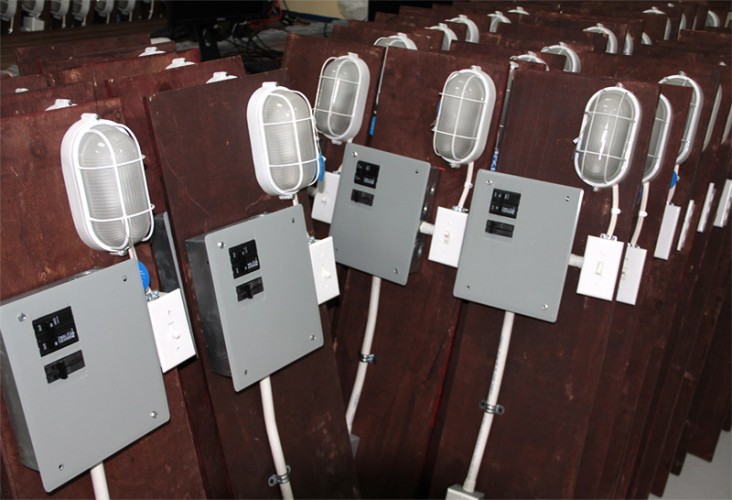Over the last ten years, Jamaica Public Service Co Ltd (JPS), Jamaica’s privatized electric utility and the sole provider of electricity on the island, has faced pervasive challenges related to system losses. Total system losses currently stand at approximately 26.5 percent and are driven by both technical losses (power losses due to equipment inefficiencies) of 8.6 percent, and non-technical losses (power losses due to power theft) of 17.9 percent.
The USAID SRUC program has been working with JPS and their NGO partner, the Jamaica Social Investment Fund (JSIF), over the last two years to develop financial, technical, and direct customer engagement techniques to reduce non-technical losses and regularize illegal consumers.
As part of this effort, the SRUC team organized a workshop bringing utilities and regulators from all around the world to Jamaica; sponsored a direct knowledge exchange on community engagement techniques; and is funding a pilot project that will assist residents of the Majesty Gardens community in Kingston, Jamaica to access legal electricity via a readyboard as a safer alternative to illegal power.
SRUC’s Regulatory and Utility Loss Reduction Workshop
In June 2015, the SRUC team organized the Jamaica Loss Reduction Workshop in partnership with the World Bank Energy Sector Management Assistance Program (ESMAP). The workshop focused on international best practices for prioritizing losses, non-technical loss reduction in low-income communities, and effective approaches by regulators and utility companies to regularize customers to reduce theft and improve revenues. The Workshop invited delegations from six countries, including representatives from Brazil, Chile, Colombia, the Dominican Republic, India, and Kenya, who all shared their experiences in loss reduction, community engagement and utility performance improvement. The workshop welcomed more than 100 local Jamaica attendees from the electricity sector, including from JPS and the Office of Utility Regulation (OUR) who interacted with the international subject matter experts in working groups.
- Workshop Proceedings (PDF 269 KB) – This report summarizes the main lessons learned from the discussions between JPS and OUR as well as key takeaways from the presentations from each of the countries.
SRUC’s Readyboard Electrification Demonstration (RED) Project

Readyboards are small, inexpensive, and self-contained household wiring units for the provision of basic electricity service. A manufactured readyboard is connected to the electricity distribution system through a meter (pre-paid or post-paid) and contains protective breakers, one or more electricity outlets, lightbulb sockets, and switches for individual household electricity use. Readyboards are used to provide electricity service to low-income urban and rural dwellings across the world, including South Africa, Kenya, and Nepal, where poor housing conditions prohibit their safe internal wiring.
The RED project had a large focus on both the technical design of the readyboard for the Jamaican setting as well as techniques and approaches for community engagement in areas that have a high number of consumers “illegally hooking” up to the electricity grid. In order to help mitigate those losses and help customers access safe power, USAID funded materials for the assembly of more than 400 readyboards, which have been installed in residents’ homes and connected to a pre-paid meter. Residents participating in the program have signed up to become official JPS customers and have been engaged in demonstrations and one-on-one sessions with community facilitators on readyboard usage, payment processes, and how to use electrical appliances safely and efficiently.
Below are more detailed updates and tools produced for the RED Project
- Community Engagement Guide (PDF 113KB) – Intended for individuals charged with designing, implementing, and overseeing a community engagement, loss reduction focused program, from the perspective of Jamaica.
- Community Engagement Materials – Intended to help Jamaica Public Service Co. Ltd. (JPS) and Jamaica Social Investment Fund (JSIF) community facilitators with resident engagement and education on how to use the readyboard and how to minimize energy usage, since many residents will be paying for electricity for the first time.
- Energy efficiency and Conservation Tips (PDF 120KB)
- Readyboard Frequently Asked Questions (PDF 136 KB)
- In order to help JPS and JSIF inform their approach to the community and its residents, SRUC undertook a baseline survey of residents to ascertain basic demographic characteristics, employment and income levels, attitudes toward electricity usage, and readiness for legal electrification. See the final survey instrument here (PDF 768KB) and a summary of the conclusions here (PDF 4.4MB)
- Check out the following photo blog from the Knowledge Exchange with Rio LIGHT on Community Engagement techniques and approaches.
Continued Support and Readyboard Installation Ceremony
After completion of the baseline survey and assembly of the readyboards in Kingston, construction of the distribution infrastructure and installation of the readyboards in Majesty Gardens commenced with JPS and JSIF’s continued efforts in the community. Our photo blog describes the continuing support USAID’s SRUC program in the community, as well as a ceremony held by USAID, JPS, JSIF, and UTech marking the first time the Majesty Gardens community had a majority of residents connected to JPS electricity service.







Comment
Make a general inquiry or suggest an improvement.